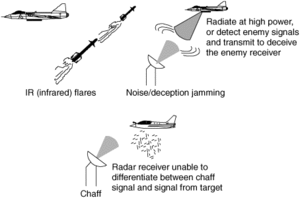Electronic countermeasures
Electronic countermeasures (abbreviated ECM) consist of technologies and techniques used to defeat enemy sensor systems, both in combat and in other situations. They can take the form of sensor jamming, stealth systems, decoys, and cloaking devices (which are a futuristic type of active stealth).
Since sensor technologies and communications technologies are often related, countermeasures to suppress sensors are often effective at suppressing communications, as well. Jamming, in particular, is often used to interfere with communications.
Stealth
Stealth is a type of countermeasure designed to keep a vehicle from showing up on enemy sensors. The principals of stealth are to minimize reflections from active sensor systems and to minimize emissions that might be detectable to passive sensor systems.
As an example, modern stealth aircraft are made of materials that absorb the electromagnetic waves emitted by RADAR systems, reducing the amount of energy they reflect. Furthermore, the fuselage of a stealth aircraft is carefully shaped to keep whatever energy does reflect from bouncing directly back toward its source. With its own active RADAR system turned off, a stealth aircraft can have a RADAR profile smaller than that of a bird.
Jamming
Jamming is an effort to blind enemy sensors with an overload of signal. If successful, the effect of jamming on a sensor system is much like looking at a very bright light with your unprotected eyes: you know there's a light source, but you may not be able to identify it because of the glare, and you may not be able to see other objects near the light source. Similarly, loud music from a stereo would be easy to hear, but the loud noise could easily drown out the sound of several people sneaking around the area.
A source of electronic jamming doesn't conceal its own existence, but it can keep itself from being identified and potentially hide numerous other objects behind the glare of signal it produces.
One early type of jamming involved dropping sheets of metal foil, called chaff, that would blind enemy RADAR by overwhelming it with reflections. Another simple jamming technique is to create clouds of smoke to block eyesight.
Spoofing
Spoofing is an effort to fool enemy sensors into reporting false information. If successful, the sensor will report detecting something different from what is actually present. A spoofing system might send out signals or energy patterns consistent with something harmless or friendly, disguising an approaching threat. Spoofing might be accomplished by configuring a vehicle to reflect active sensor waves in the same pattern as a friendly vehicle or by mimicking the transponder transmissions of a friendly vehicle.
Decoys
A decoy is a type of spoof that consists of an expendable vehicle designed to present the same image to sensors as a more important vehicle. For example, a submarine might launch a torpedo designed to sound like the submarine itself. The purpose of a decoy may be to distract guided missiles from their intended target or to divert enemy resources away from an actual threat.
In Star Wars
All combat craft in Star Wars are equipped with some kind of ECM system, typically sensor jamming.
At the Battle of Yavin, the Death Star's jamming was so intense that the Rebel fighters could not detect enemy fighters on electronic sensors (including electronic optical sensors) until the Imperial fighters were right on top of them. The Rebel pilots had to rely on visual sighting to find enemy fighters. Similarly, at the Battle of Endor, Imperial jamming made it impossible for Rebel sensors to tell whether the shield around the Death Star was functional.
In Star Trek
While the most common ECM in Star Trek is the cloaking device, general stealth, jamming, and spoofing techniques are sometimes referenced.
- Worf proved adept at spoofing in TNG "Peak Performance".
- Transport inhibitors can be used to disrupt transporter lock-ons, interfering with efforts to beam people or objects out of an area.
- While individual ships generally aren't able to use jamming to hide their location, they can use it to hide their contents, as Cardassian freighters did to hide their cargoes of war supplies in TNG "The Wounded".
- A mercenary freighter used special materials in its hull that made it invisible to long-range Federation sensors (TNG "Gambit").
In Babylon 5
The most noteworthy ECM in Babylon 5 is the stealth technology employed by the Minbari Federation. This technology makes Minbari ships essentially invisible to enemy sensors if they choose to be. Even when running their own active sensors, Minbari ECM technology prevents the sensors of the other Young Races from obtaining weapon locks.
In Mass Effect
In Mass Effect, stealth ships (such as the SSV Normandy) have special engines and heat sinks that allow them to operate for a period of time without radiating any heat. This is effective in the setting, where infrared sensors are the primary means of detecting starships. The Normandy also obtained and installed a Reaper IFF system, which EDI was able to use to spoof Reaper sensors and avoid attack by Reaper forces on multiple occasions.
More conventional electronic warfare is referenced occasionally.
